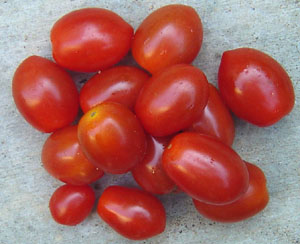Canada has to make the simplest things mindnumbingly confusing and bureaucratic. Who has four federal elections in seven years?
On April 29, 2011, Six L’s of Immokalee, Fla. voluntarily recalled a single lot of grape tomatoes, because they had the potential to be contaminated with salmonella. The contamination was detected through a random sample obtained by the U.S. Department of  Agriculture at a distributor in New York. The product is from a farm in Estero, Fla. that has since ceased production of that commodity.
Agriculture at a distributor in New York. The product is from a farm in Estero, Fla. that has since ceased production of that commodity.
The specific lot was packed on April 11 and was comprised of grape tomatoes that can be identified by Cherry Berry lot code DW-H in either in clam shells or 20 lbs. cardboard containers. The product was distributed to North Carolina, South Carolina, Alabama, Florida, New Jersey, New York, Michigan, Pennsylvania, California, Georgia and Canada, and reached consumers through retail stores and restaurant distribution.
No one was sick, USDA tested and found something, at least someone was awake.
But that recall grew. It grew and it grew and it grew until Canada decided it had to do something (apologies to Bob Munsch).
On May 2, 2011, the Canadian Food Inspection Agency took time off from voting in the latest federal election to proclaim that Mastronardi Produce of Kingsville, (that’s near Leamington, in Ontario in Canada) was voluntarily recalling grape tomatoes because they may contain Salmonella anatum.
Mastronardi Produce is taking this action after they were notified by a supplier about one lot of tomatoes that was later determined to be contaminated with Salmonella anatum. The supplier was Six L Packing Company from Immokalee, Florida.
Was Mastronardi, a well-known greenhouse vegetable grower, repacking grape tomatoes from Florida? No, just redistributing.
That’s what Richard Lee, operations manager of the Ontario Greenhouse Vegetable Growers, told me this afternoon. He also said Mastronardi was “helping out” CFIA types, but that people are “poorly educated” about the difference between greenhouse and field grown tomatoes, so OGVG put out its own press release today.
“OGVG would like the public to be aware that this product is NOT of Canadian origin and NOT Greenhouse grown. The original supplier of these tomatoes was Six L Packing Company from Immokalee, Florida.”
(People who write in all caps are yelling; why are you yelling at me?)
“Retailers and consumers can continue to feel confident when purchasing Ontario greenhouse tomatoes,” said OGVG General Manager, George Gilvesy. “All Ontario  greenhouse tomato, cucumber and pepper growers are required to pass an annual third party food safety audit as part of OGVG’s licensing regulations. This helps to ensure that all greenhouse vegetable growers are following important food safety standards.”
greenhouse tomato, cucumber and pepper growers are required to pass an annual third party food safety audit as part of OGVG’s licensing regulations. This helps to ensure that all greenhouse vegetable growers are following important food safety standards.”
How often is water quality tested? How about pathogen testing? Are growers and packers notified before the auditor shows up? Are those results public? The program we designed 13 years ago for the greenhouse veggie growers had all those elements, along with round-the-clock food safety assistance and at least decent communications with buyers and consumers. But third-party auditors became the preference of the industry – the folks that enabled salmonella in peanut paste, E. coli in produce, salmonella in eggs, and virtually every other outbreak over the past decade.
At some point, people will realize that proclaiming a third-party audit in the absence of any meaningful data is groveling to the lowest common denominator.
Sorta like the way the Liberals and Bloc were annihilated in the federal election yesterday. Some Canadians woke up.
 Layla Khan, 23, filmed the dodgy vendor in the village of Afzalpur, Pakistan, after her aunt ate his grapes and contracted diarrhea.
Layla Khan, 23, filmed the dodgy vendor in the village of Afzalpur, Pakistan, after her aunt ate his grapes and contracted diarrhea.

 Agriculture at a distributor in New York. The product is from a farm in Estero, Fla. that has since ceased production of that commodity.
Agriculture at a distributor in New York. The product is from a farm in Estero, Fla. that has since ceased production of that commodity.